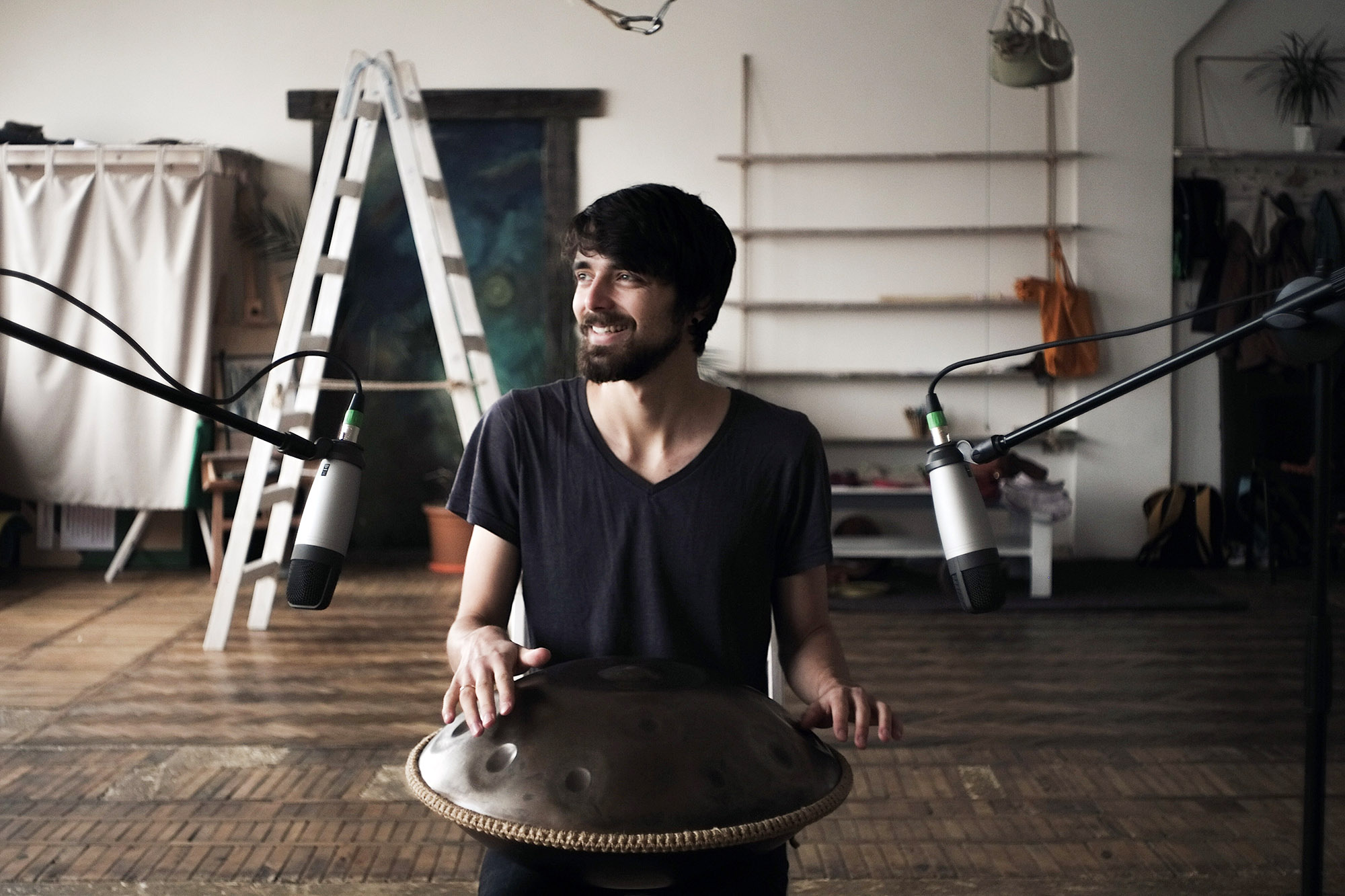
Time for Silence
Street musicians in Lviv can play from four o’clock in the afternoon on workdays and from noon on weekends and holidays. They have to finish by ten o’clock. Beyond that is the time for silence. Oles Deineka has been playing on the streets of Lviv for two years already. He plays a handpan, an instrument that resembles a flying saucer and clangs when he hits its surface with his fingers. Yet, before he got up the courage to play for passers-by, he had to find the courage to stop fearing that street art was not a respectable profession.
Italy, 2014. Welcome!
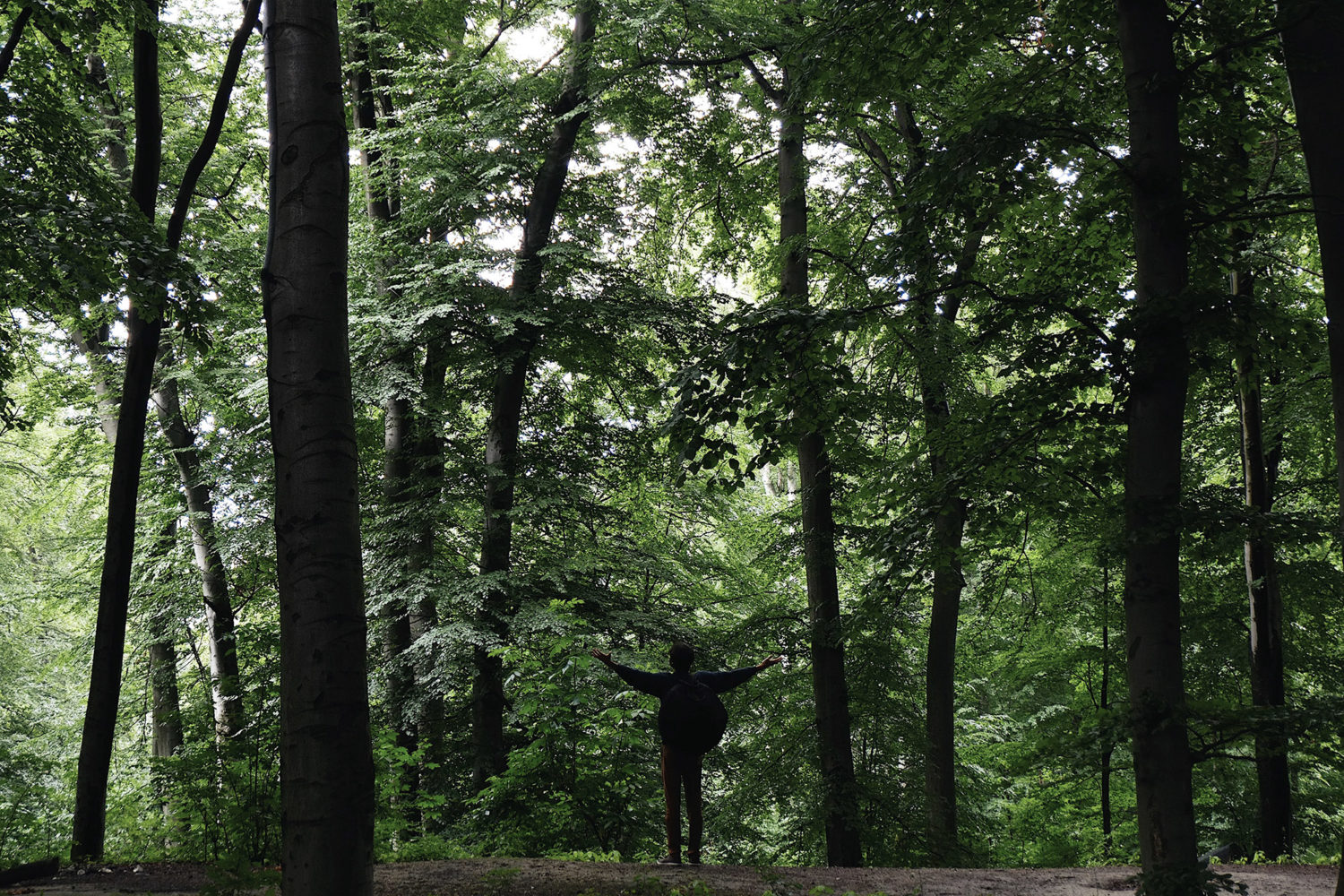
Oles knew he couldn’t doubt himself, for it would only lead to fear. He needed to act fast and without overthinking: go online, choose the cheapest flight, and buy a ticket. Which country came up? Belgium? 15 Euros? Done!
Then, just as fast, he needed to go to WWOOF website, a platform where farmers invite volunteers from all over the world to stay at their farms for free in exchange for labor. He chose several farms in Belgium and sent them emails. Soon enough, he got a short “You are welcome, Oles” from one of them.
Belgium, 2014. Pulling Weeds
At the farm, it turned out you could live without money: people weren’t using it, because they had everything they needed. The world wants for nothing anyway, even if you can’t make or grow everything yourself. Take for example the farm’s bottomless wardrobe with God-knows-whose rags tucked away in it. There are plenty of clothes no one needs. The same goes for food. The farm had an arrangement with the closest supermarket so that recently expired food was delivered there. “It was just, like, wow: tons of delicious food, and everything was free,” Oles says.
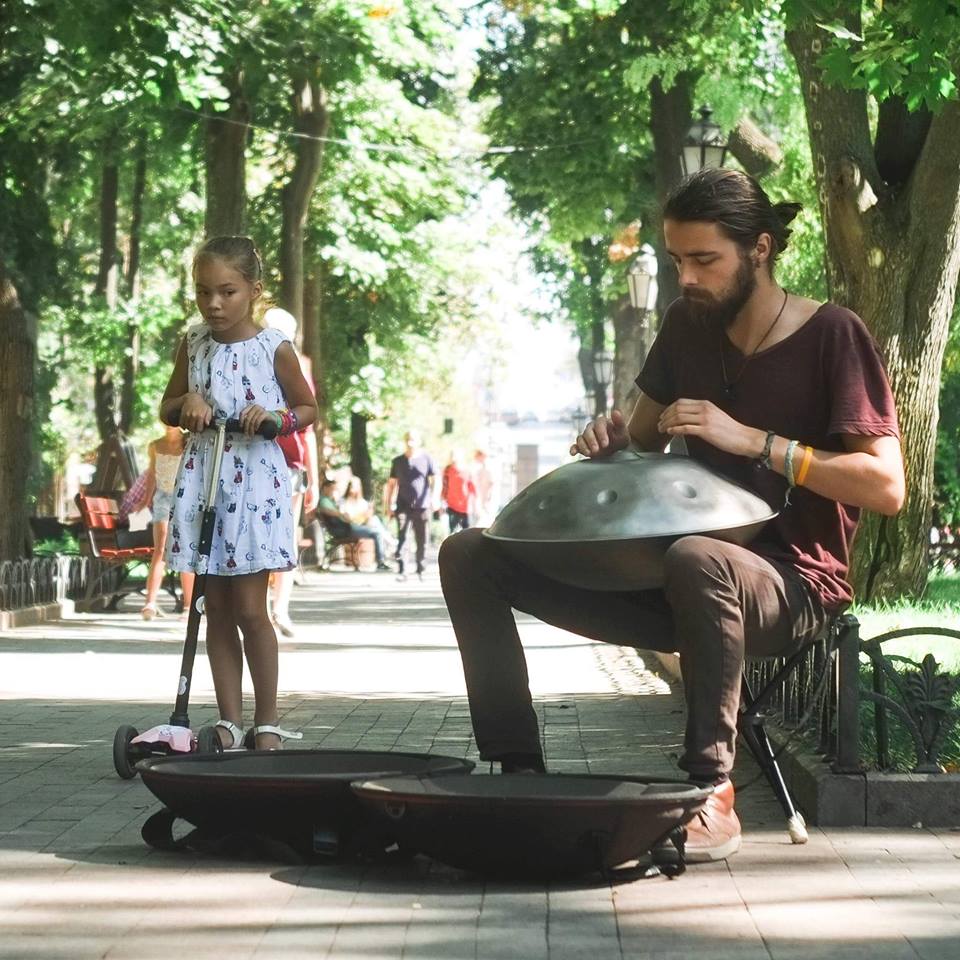
You could do practically anything you wanted on the farm. If you didn’t know what else to do, you could always go and pull weeds. For three hours in the morning and then for two hours in the afternoon; the rest of the day was free. You could lie around, sing, talk, or suggest some activities to other volunteers. If inspiration struck during what were supposed to be working hours, you just had to say, “Excuse me, I really need to do my own work now.” And there’d be no questions. And no pressure. There’s always plenty of weeds.
“People live at the farm for years. If you contribute to the community, you can stay as long as you wish,” Oles says. A street artist named Frank, for instance, has returned to the farm a couple times and spent a lot of time there. Oles was there for a month.
The first thing he did when he returned home from the farm was take his laptop to his father’s shop where he repaired computers. “Please sell it,” he said. He had decided he wouldn’t need it anymore.
Belgium, 2014. Market Day
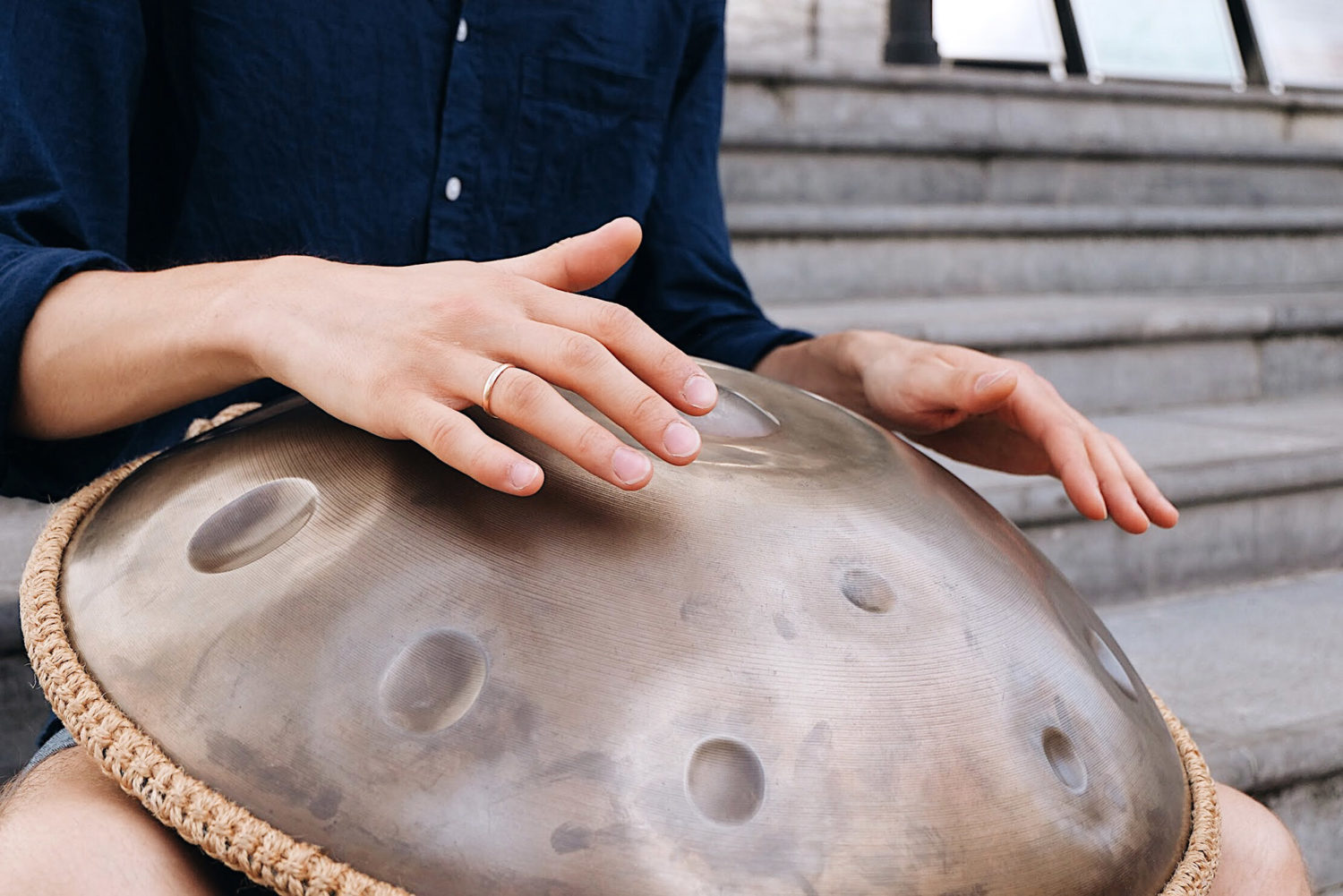
“If you don’t know what to do, pick up a broom. That’ll be your thing. People will walk by, and you’ll stop them, sweep the sidewalk in front of them, and then let them pass,” Frank suggested. At that time, he had been doing street art for twenty years and had even organized festivals, so there was no reason not to believe him.
Oles did just that. In that big wardrobe with the clothes that belonged to nobody—anyone could leave his or her clothes there and take someone else’s—he found a suit: black highwaters, a white shirt, a black jacket, and a black hat. Everything was a bit too small or too big. Then he grabbed a broom and was all set to go.
Oles, Frank, and a dozen of their friends got in a van—Frank’s house on wheels—and drove off to the market in the nearest town.
By himself, Oles would have never had the guts to disturb the well-ordered chaos of a market square. However, he had friends doing it with aplomb by his side: some of them played instruments, some juggled. Frank blew gigantic soap bubbles. The performance was free, and they had no intention of making money as long as they were entertaining themselves and other people.
Switzerland, 2000. Slaves to the Lamp
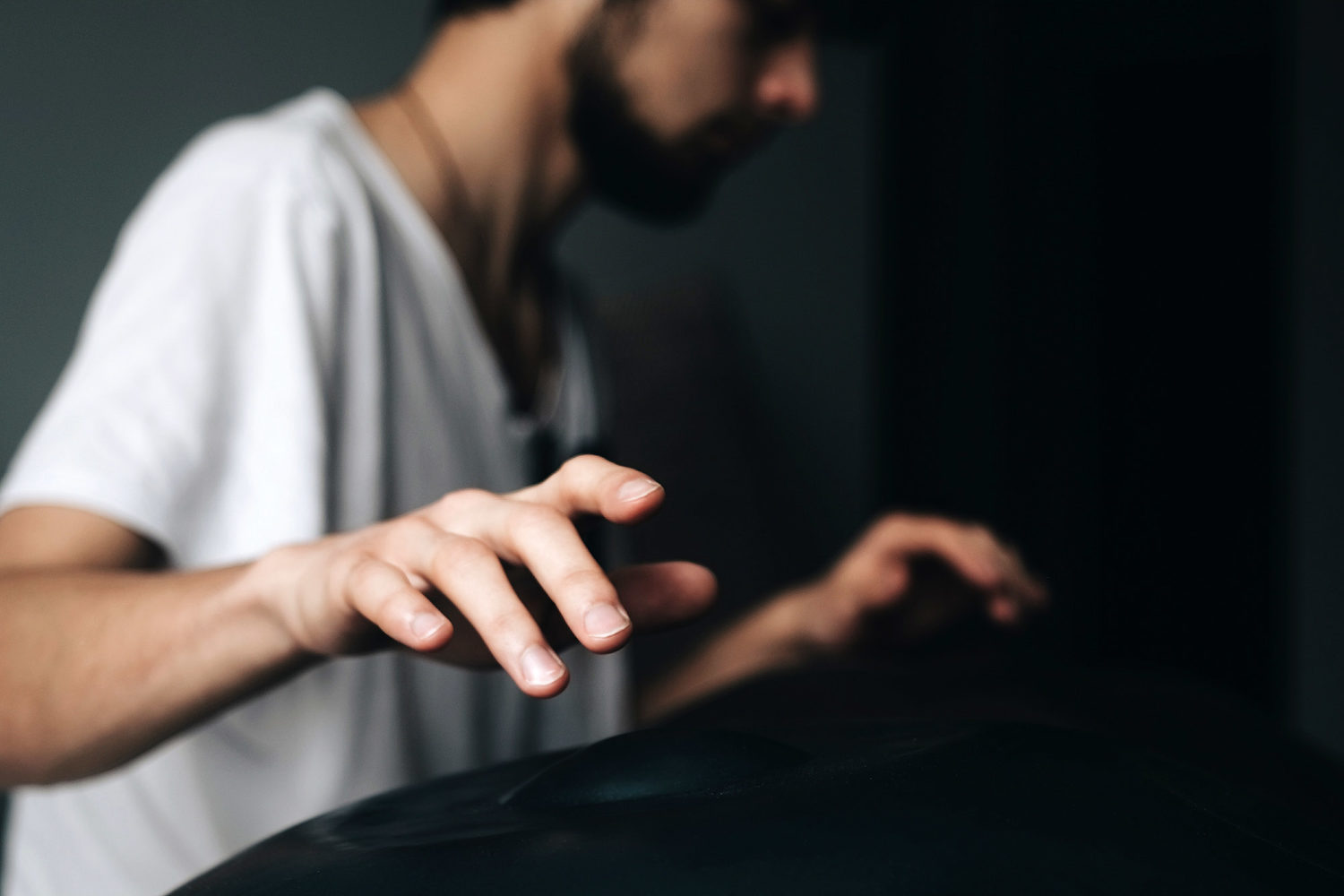
“You might have thought the makers of this musical instrument were elitists. But those who happened to meet them personally know they are anything but elite.”
–From a website on the history of the handpan
At the start of the new millennium, Felix and Sabina invented a new sound for steel in the Swiss capital. They took two sheets of steel, formed them into concavities, used a hammer to put dimples in certain places, and then heat-treated the steel with nitrogen (nitriding). The top dome was called the “ding,” and the lower one was called the “gu.” They were fastened together to create a cavity in between, making the instrument look like a flying saucer. They called it a Hang and took out a patent for the technology and design of the instrument. Hang was registered as a trademark.
Felix and Sabina first presented their musical instrument at a Frankfurt music fair. It was the second year of the new millennium. From then on, they turned into “slaves to the lamp” meaning, the Hang. Demand for it was so high that Felix and Sabina could not keep up with orders even though they worked nonstop. People had to wait for years while the instrument was on backorder. There was so much demand that the makers had to open foreign offices. In one month they could make between two and five Hangs. With this stream of orders there was absolutely no time for experimenting with sound and technology.
Italy, 2014. Yogurt
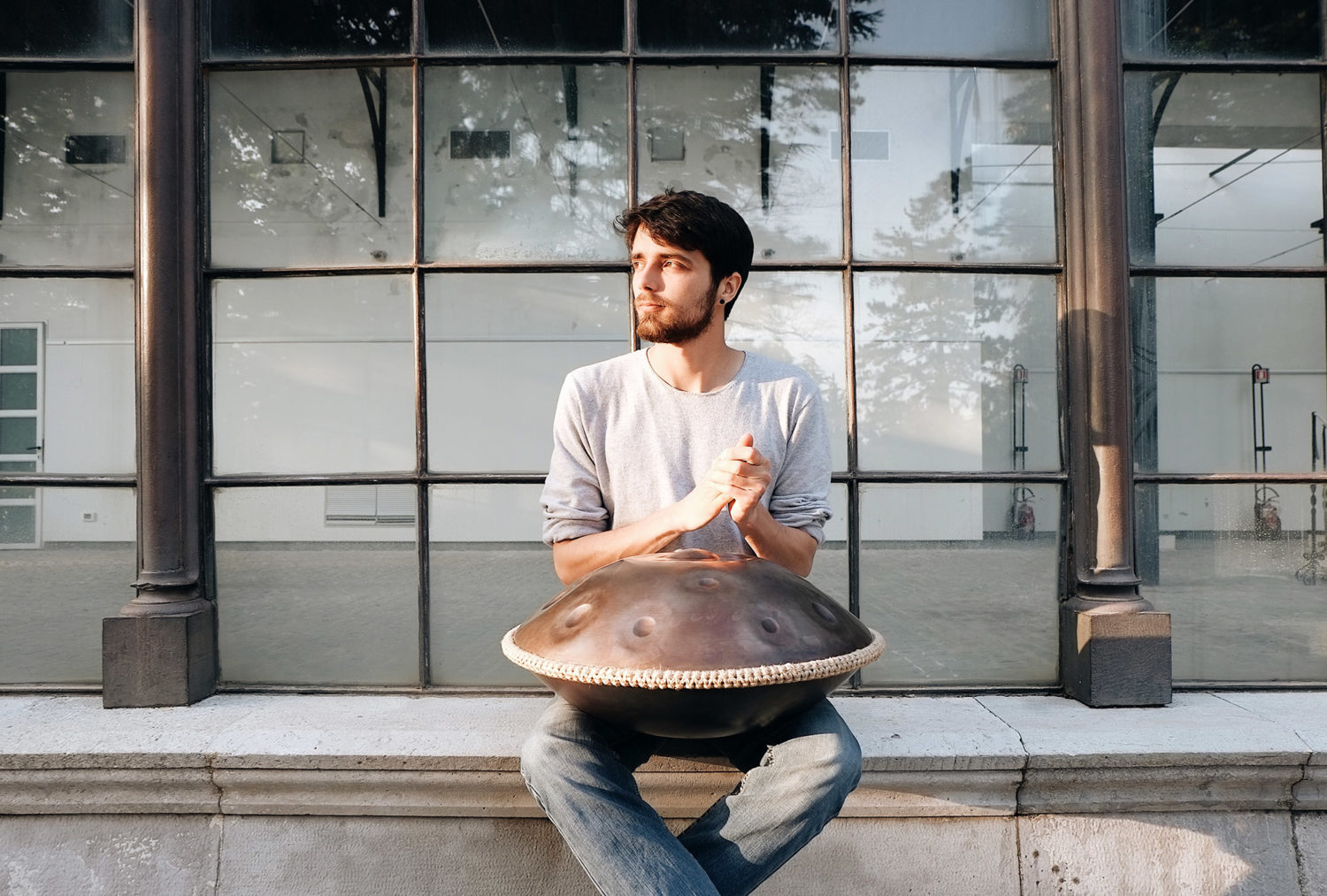
Oles was born in Kolomyia, but he moved to Italy as a child to be with his parents. His father studied at a music academy in a town called Osimo to become an opera singer. “To be an opera singer, it’s better to be alone,” Oles’s father told him. But he wasn’t alone and eventually had to abandon singing in order to earn enough to meet his family’s needs. Later on, he opened his own IT shop where he repairs computers to this day.
His mother learned Italian when she was a student in Lviv. In Italy, she earned her master’s degree and got a job at a museum. The children, Oles and his brother, joined their parents in the first year of our millennium.
“I still sometimes catch this smell even now, but I don’t know how to explain it,” Oles says. He also remembers yogurt: “We rarely ate it in Kolomyia because it was too expensive. In Italy, there was always plenty of yogurt at home. I ate that yogurt and felt happy.”
Then, suddenly, he was used to everything. Italian he remembers as two extremes: “can’t say a word” and “totally fluent.” “It is easier for children to move into a new language,” he assumes.
Oles finished school and entered a university in the city of Trieste. Soon enough he realized he was wasting his time and abandoned the studies. He delivered pizza, played the drums, and, at a certain moment realized he was addicted to computer games. He was antisocial and reserved. He wanted change: “I realized I was missing something and doing something wrong.”
The music of street guitarist Estas Tonne helped. When he listened to it, Oles felt he wanted to travel. That’s where he got the idea to go to a farm.
Switzerland, 2005. Time for Silence
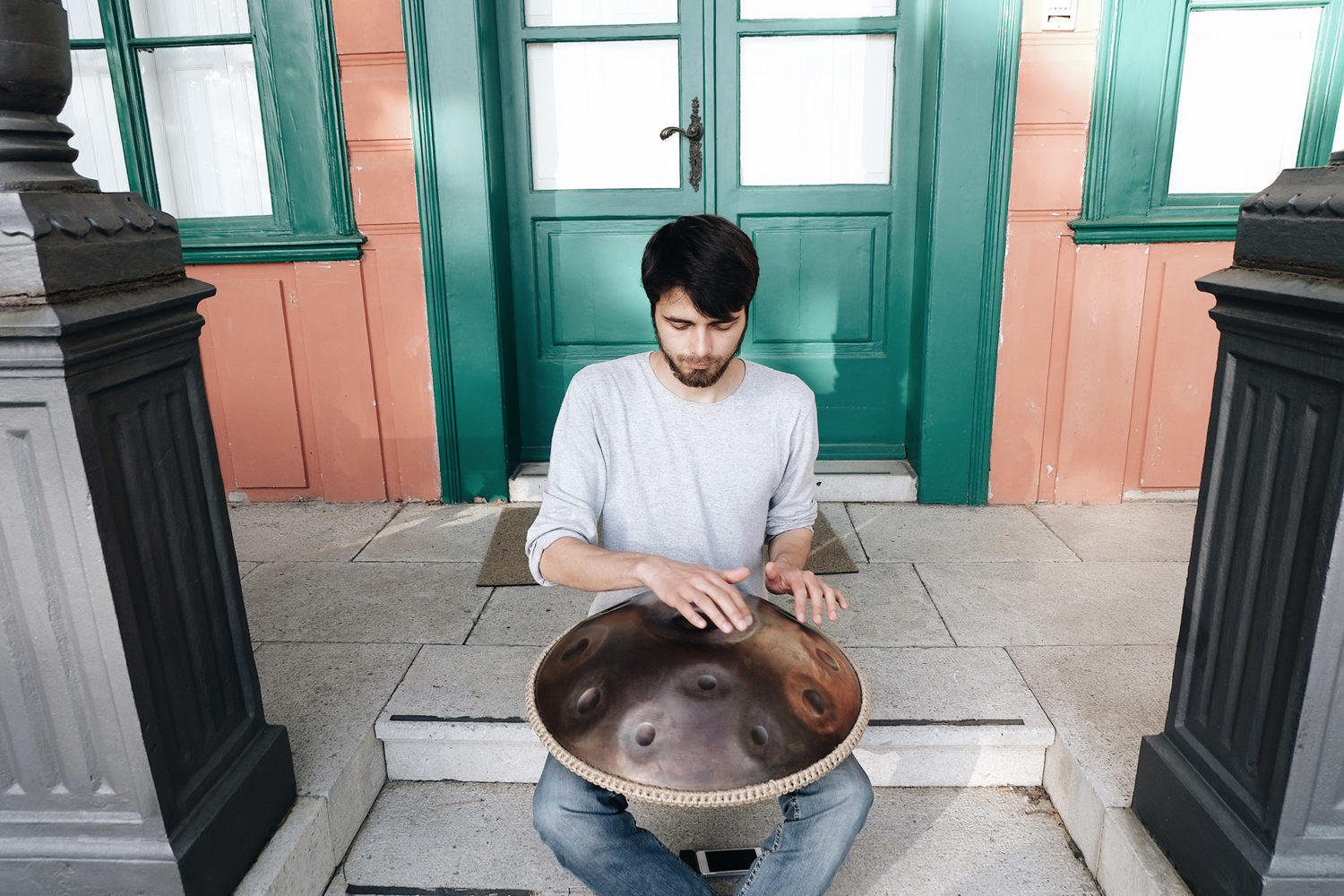
“I’ve just discovered the incredible sound of a handpan; I want one for myself. However, it seems like it is impossible to buy one unless I go to Switzerland myself. But I’m hardly going to do that any time soon… I’d like to play a handpan to my children while they are falling asleep.” Matt, USA, feedback on the manufacturers’ website.
“I don’t know how they evaluate letters, but I have already been refused once. Anyway, I’m keeping my hopes up and writing them again.” Roban, Lausanne, feedback on the manufacturers’ website.
“We need some time for silence,” Sabina told Felix. It was the sixth winter of our millennium. The manufacturers had arranged themselves a Hangruhe, a rest from Hangs, for the first time. They notified the people who wanted a Hang and stopped taking new orders or making instruments for three months. They worked on improving the sound and on new ideas. They found they had neither the desire nor the energy to get back to their previous tempo: a fundamental change was necessary. So they closed their foreign offices and got rid of their website. Now to order the instrument, one needed to send them a paper letter to the address PANArt Hangbau AG, Engehaldenstr. 131, 3012, Bern, Switzerland. You could only pick up your Hang in person. There were no deliveries.
When people did send them emails, they received a pat answer: “You can send emails to this address regarding repair of the instrument only. Please send all other inquiries by post.”
Italy, 2014. Fear
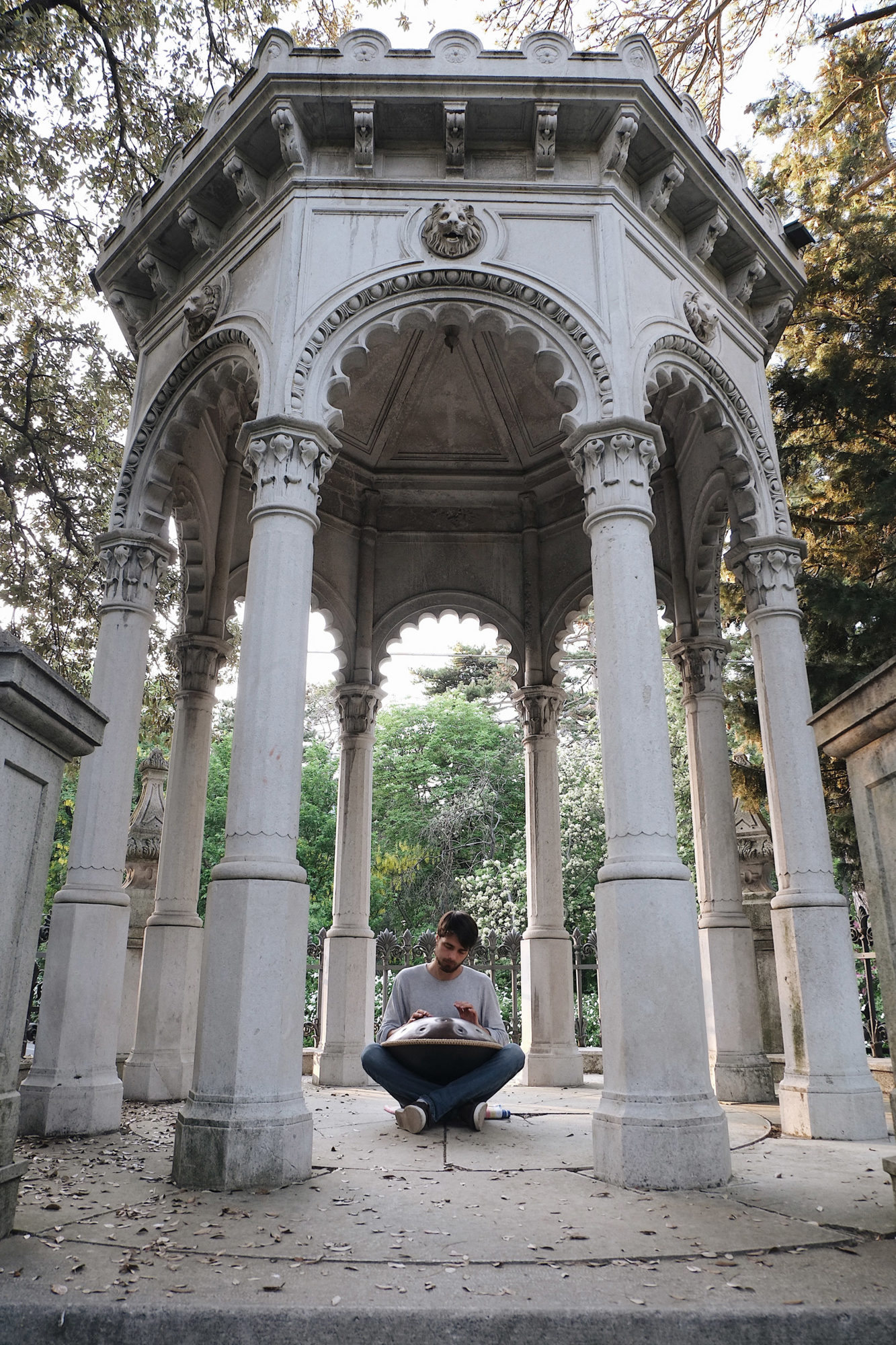
“It seems like all eyes are on me, like everybody’s interested in and judging me,” Oles explains. When he got back to his ordinary life in Italy after a month at the farm, he decided to do street art. He started with soap bubbles. He mixed up a batch of the secret recipe he learned from Belgian Frank at the farm, and went out to the streets. His palms were sweating. What if he ran into his friends? What would they think? Street art isn’t very cool, is it? Isn’t it lame?
A year passed before his anxiety subsided and Oles realized that nobody actually cared. “People have lots of their own thoughts, so they don’t care who’s doing what unless it’s bothering them. But even if they criticize you, they’ll forget about it in five minutes,” he convinced himself.
He later quit his job as a delivery boy at the pizzeria so he would have no choice but to get out in the streets. Besides, he was earning more with the bubbles than with pizza.
Switzerland, 2018. Permission
If other manufacturers want to use this technology, they must acquire a license.
–PANArt website.
Seven years passed from the time Sabina and Felix founded the PANArt company to when they made their first Hang: to make good music, they needed good steel. The manufacturers spent a long time working their magic with it, and then patented the technology and even the design of some instruments: in the USA, they hold patent number 8552279, and 2443625 in Europe. Since then, their exclusivity has been “attacked” every so often. Still, Sabina and Felix are sure: everyone duplicating, copying, or forging Hangs and calling their instruments hang drums, domes, or hang hangs simply wants to cash in on the world’s longing for extraordinary music. Fake instruments are often of a lower quality, and the prices are unreasonably high.
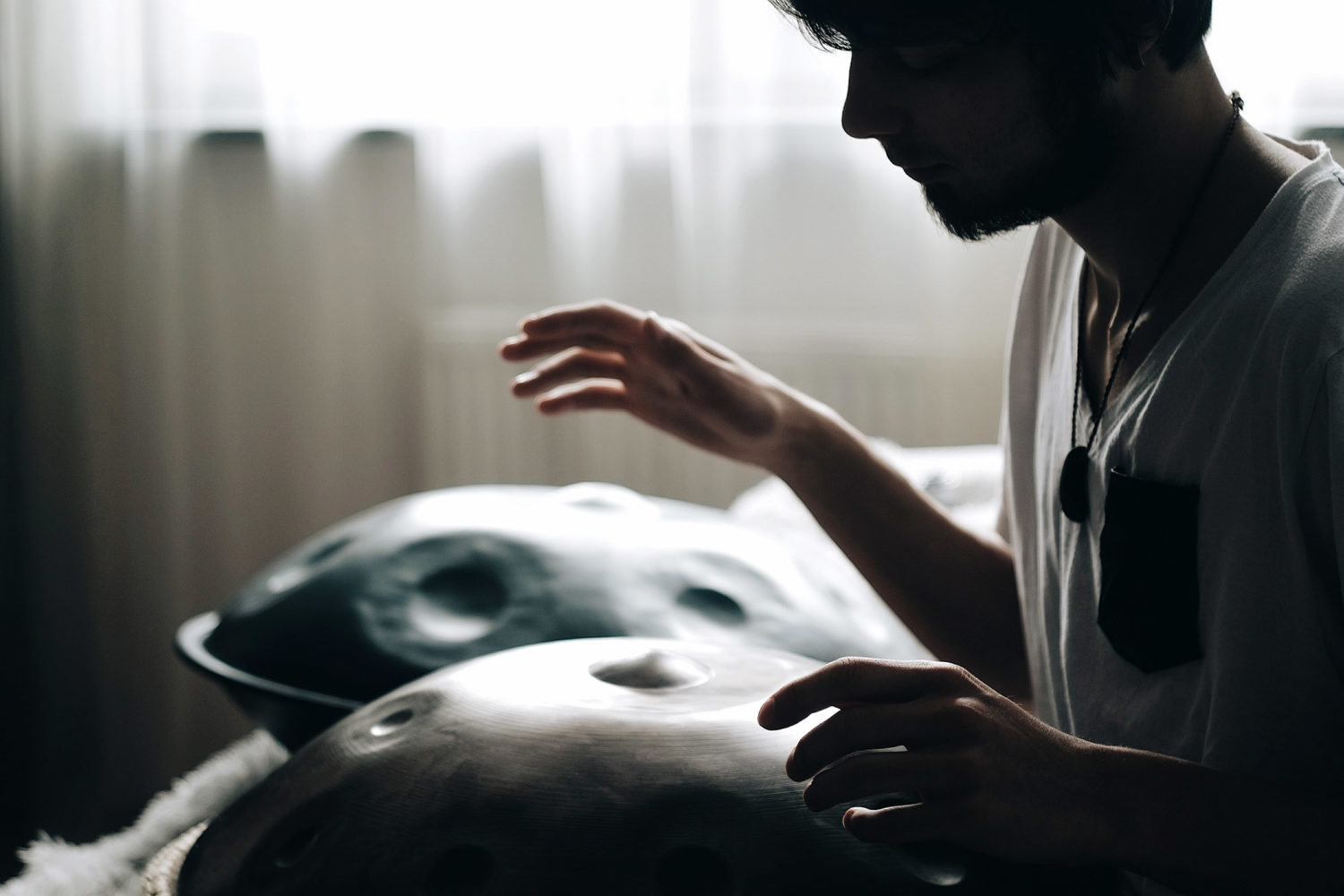
However, demand has caused everything to settle into place. Nowadays, there are about 150 companies making some version of the hang worldwide. The musical instrument is now commonly referred to as a handpan.
“Even if it dissents from the spirit of the time, PANArt will keep on with settling those agreements with their customers. A signature and a handshake still have a value for us,” the PANArt website says. It was relaunched after some time for silence.
Italy, 2015. Patience
Oles has only been waiting for his handpan for a year. He found manufacturers in Turin. They took his order, said it would cost 1100 Euros, and told him to be patient. It was the fifteenth year of our millennium.
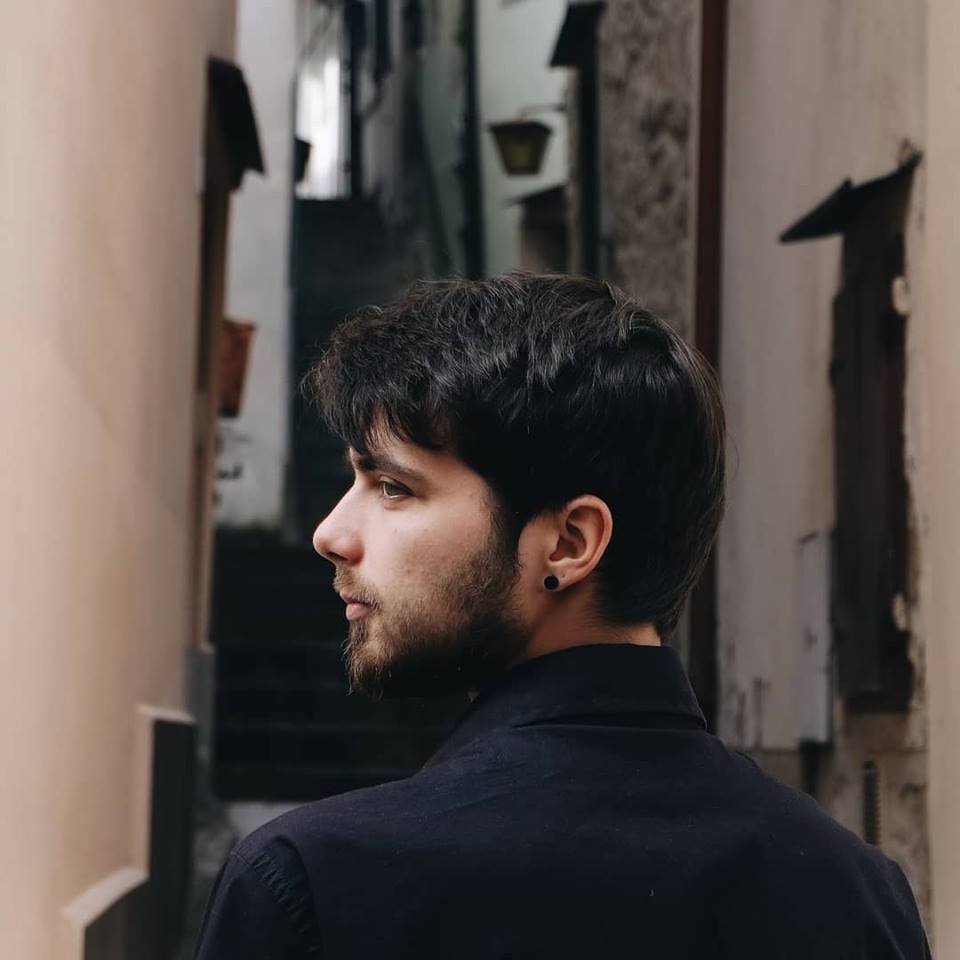
While waiting for his handpan, he started playing the steel tongue drum. He would walk the streets of Trieste with it, repeating to himself every now and then, “No one actually cares about me.” After a year he went to personally pick up his handpan in Turin, though he could have had it delivered.
“It would be great if you could learn to play that thing,” a friend had told Oles back at the farm, showing him the most popular handpan video on YouTube. “I’d seen the instrument before, but I never thought I would play it,” Oles recalls. He decided not to wait until returning to Trieste, and took straight to the streets of Turin with his handpan.
Lviv, 2016. Freedom of Choice
In spring 2016, Oles moved to Lviv. He first went to Kolomyia for Easter, but he got bored there pretty quickly. So he got on a train with his brother and set off on a trip. He liked playing on the streets of Lviv so much that he returned and then decided to stay for a while. “When I’m living in Lviv I feel like I’m constantly traveling. When I play on the streets, people approach me to chat or treat me to coffee. There was nothing like that in Trieste.” When asked about the most important meeting he has had thanks to his music and the streets, he replies: meeting his wife.
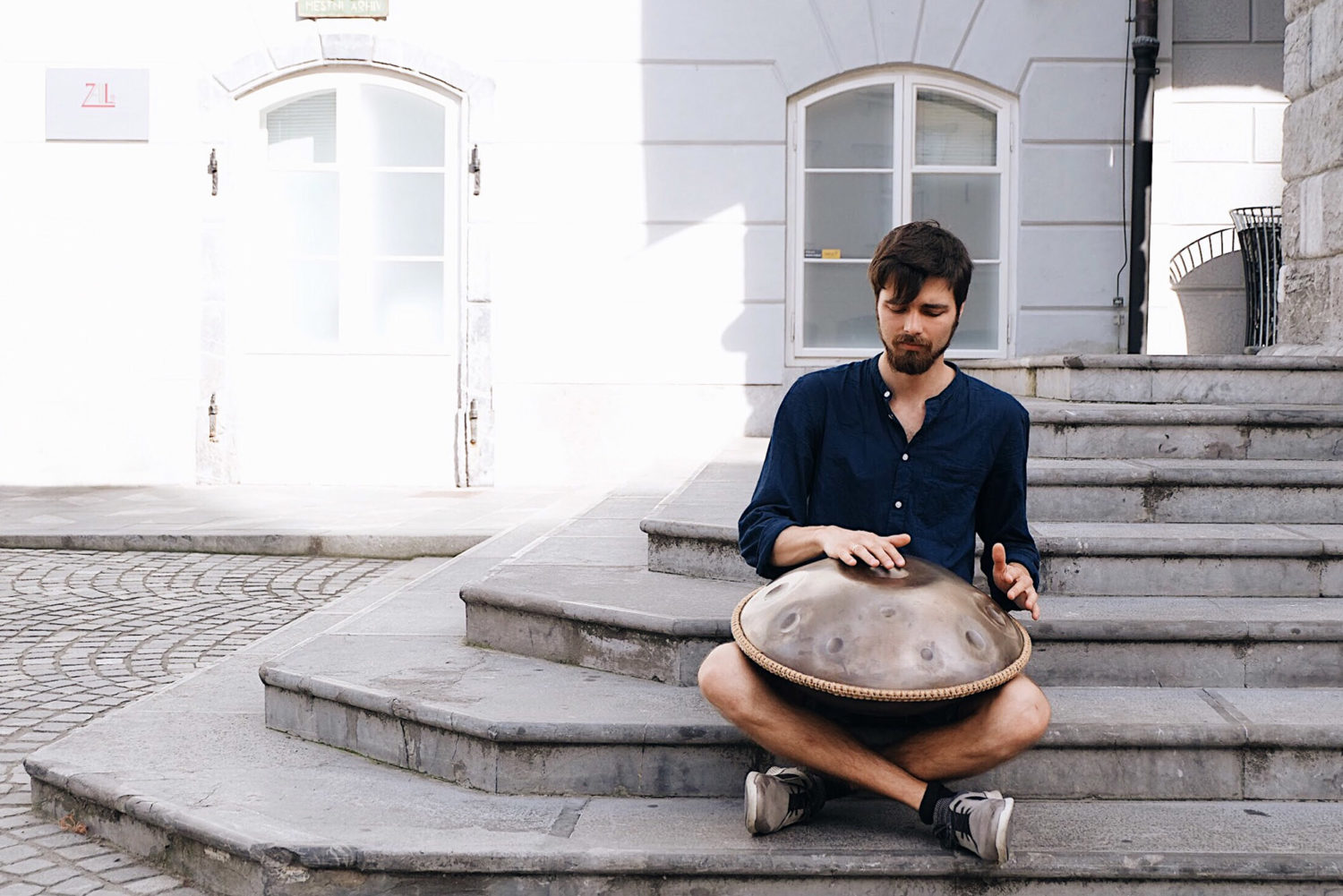
“For me, playing on the streets is a symbol of freedom. First of all, it’s the freedom from the fear of being criticized. It is also a reminder that each person must learn to give something back,” Oles says.
He has never been obsessed with money. Besides, when playing on the streets, the money you get is impossible to predict or influence. If you focus on money, it gets much harder to dive into the process, that is, into music. And that is what’s most important for Oles. In any case, people evolve when they learn to give instead of take. And that’s about more than just music.
However, since Oles is now responsible for more than just himself, money has turned into his responsibility to others. “Sometimes I treat playing on the streets as a job. Then I play for results without inspiration,” he says. “So, on the one hand, I lose the value of this music. On the other hand, freedom must have limits.”
Freedom gets limited when responsibility appears, Oles says. But choosing those limits for yourself is also a kind of freedom.
Anywhere, Anytime. The Way Out
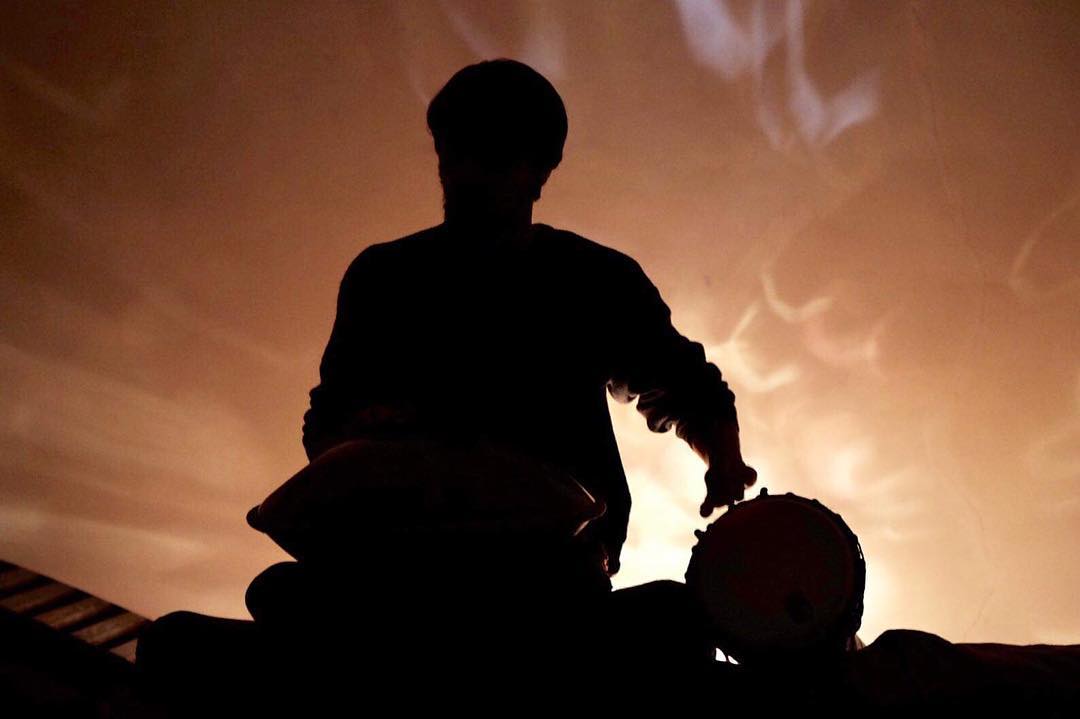
To earn more and keep pace with the competition, Sabina and Felix must abandon their principles and rituals like the annual three-month Hangruhe, taking orders by mail, and not offering delivery. Otherwise people will soon look to get their instruments from companies who will make them faster and not demand too much effort (like personally traveling to Switzerland after already having waited a few years for the order). Yet, if Sabina and Felix agree to this, they will lose their chance to invent new, different, and better sounds for steel. Experiments with music require silence.
To earn more, Oles needs to play where there are lots of people. But crowds means noise. It also means other musicians who prefer crowded places for the same reason. The handpan’s music gets lost in the din: it cannot compete with the buzz of conversations, let alone other music. So Oles chooses quiet places with good acoustics: the passageway between Virmenska Street and Lesia Ukrainka Street or Koliïvshchyna Square.
Music needs silence, too.
Translated by Ali Kinsella.
[This publication was created with support of the Royal Norwegian Embassy in Ukraine. The views and opinions expressed in this publication are those of the authors and do not necessarily reflect the official position of the Norwegian government].
Have read to the end! What's next?
Next is a small request.
Building media in Ukraine is not an easy task. It requires special experience, knowledge and special resources. Literary reportage is also one of the most expensive genres of journalism. That's why we need your support.
We have no investors or "friendly politicians" - we’ve always been independent. The only dependence we would like to have is dependence on educated and caring readers. We invite you to support us on Patreon, so we could create more valuable things with your help.
Reports130
More






